Westleigh High School and Technology College is a secondary school in the north-west of England. A group of seven Westleigh students has been working on a participatory photography project. They have been taking and using their own photographs as a way of exploring and sharing their experiences of education.
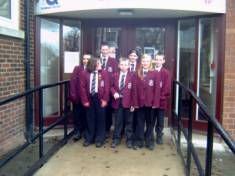
Students involved in the project
The students have been working together with a specialist teacher in the school, an outside researcher from the University of Manchester, and a member of the local education authority’s learning support team. The students involved in this project are part of a ‘nurture group’ in the school which has been set up to help students who have learning and/or behaviour difficulties in school. Students with learning difficulties are traditionally the least likely to have a ‘voice’ and a say about their experience of education and schooling, and are most at risk of social and educational exclusion. Westleigh school became involved with this participatory photography project through the belief that students who are struggling with school should be encouraged to express their ‘voices’ and share their perspectives. They felt that these students’ insights and concerns should be addressed and taken seriously by staff in the school.
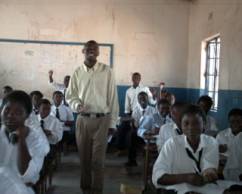
Photograph taken by Zambian student: “This
is a picture of something good. I wanted to
show this is a good teacher…a teacher I like.”
In preparing to do their project, the Westleigh students looked at photographs taken by students in other schools during similar projects. One photograph in particular caught their attention. It had been taken by a student in a Zambian school, and showed a teacher he liked. The picture inspired the Westleigh students to ask questions about what Zambian schools are like and what the experience of schooling is like for Zambian students.
The Westleigh students expressed a desire to share their experiences and photographs of their school with students in Zambia. The photograph of the Zambian teacher also encouraged them to speculate on what makes a good teacher. One of the key aspects of education the Westleigh students chose to focus on was teaching and learning. Through this project, they have shared their insights into what makes a good (and not so good) teacher.
In the course of their schooling, students learn what teachers expect from good students; but teachers don’t always ask students what they think makes a good teacher.
Students have great depth of insight into teaching and learning, and their perspectives should influence these processes. Students’ understanding about good teachers and good teaching have value within their school and in the wider community. Their opinions and ideas could, and should, be incorporated into teacher training programmes.
Students’ comments and photographs
The photographs and text in the box below are part of a display created by the students to show to others, both within and outside their school.
 |
 |
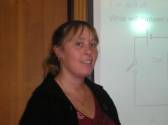 |
| Good teachers keep you on task and when you agree with them and they agree with you, can do fun things. We like teachers that you can mess around with a bit and have a laugh, but still be dedicated to the work. Some teachers make you do work all the time, but others break it up and let you go on the computers or watch a video sometimes. One of our favorite teachers acts more like a student instead of a teacher. Sometimes he can be strict, but he acts normal with us. He’s calm instead of shouting. | ||
 |
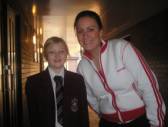 |
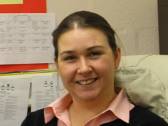 |
Although the Westleigh students expressed the belief that good teachers should be able to be friendly and informal with students, they also stressed the importance of consistency and discipline. The students suggested that good teaching involves a balance of firmness, support, humour, fun and flexibility.
Here are some of the students’ own words on the subject:
- ‘Good teachers help you. They help keep you on task by doing things like helping you to keep a report book (on your work and progress) and going over it with you.’
- ‘When teachers are happy it’s good, but when they raise their voices, sometimes it scares the children and they don’t like it. Being friendly and laughing is important.’
- ‘Good teachers don’t take everything so seriously all of the time.’
- ‘It’s better when teachers get to know you and your work so they know what you’ve done and what you haven’t done and can help you.’
Contact: Mrs E. Broxton
Westleigh High School
Westleigh Lane
Leigh, Lancashire
WN7 5NL, UK
Mrs Broxton is in charge of special educational needs.
This article was compiled and edited by Ian Kaplan in collaboration with staff and students at Westleigh High School. Ian is a research associate at the University of Manchester. Email: ian.kaplan@manchester.ac.uk, or contact via EENET.
To find out more about the use of participatory photography and other image-based activities in inclusive education research and practice, please contact EENET. We encourage all readers to engage in more activities to find out what children think about: education, their experiences in school, what makes a good teacher, and what we could be doing to train and support better teachers. Please share your experiences of such activities, and the children’s opinions, with EENET.
